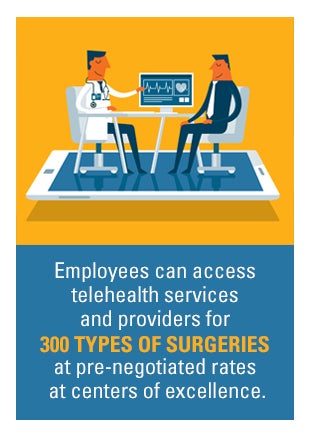

3 Things to Know about the Latest Disruptor in Employer-Sponsored Care

The landscape is littered with failed ventures from well-intentioned, well-funded startups that set out to overhaul the employer-sponsored health care system. But the recent formal launch of Transcarent, a Silicon Valley health tech firm planning to transform employer-sponsored benefits, bears watching.
Led by Livongo founder Glen Tullman, Transcarent’s digital health platform is designed to facilitate improved outcomes and cost-effective decisions by workers.
The platform provides employees of self-insured employers and their families with information, guidance and access to care. Employees using the platform can access telehealth services and providers offering bundled care for 300 types of surgeries at pre-negotiated rates at centers of excellence across the country. Transcarent plans to deliver these resources at no cost to patients and won’t charge employers up-front costs or monthly fees per member.
 Instead, the company will make its money through risk-based contracts and take a pre-negotiated cut of the savings it delivers to employers. Tullman says that all will share the benefits of reduced costs and improved quality by helping workers find high-quality care at a lower price.
Instead, the company will make its money through risk-based contracts and take a pre-negotiated cut of the savings it delivers to employers. Tullman says that all will share the benefits of reduced costs and improved quality by helping workers find high-quality care at a lower price.
Transcarent’s platform will provide patients with seamless, quick access to essential information and providers as they make decisions about everything from routine care to where to have surgeries. Users download an app that connects them with a physician within 60 seconds 24/7. Patients can access the platform for a second opinion, receive virtual care or receive help with surgery management, among other services.
BridgeHealth, which merged with Transcarent last fall, will be pivotal in this effort. Its surgical centers-of-excellence programs for large, self-insured organizations help members identify high-quality providers who perform surgeries at bundled rates. The company has 160 centers of excellence and ambulatory surgery center partners and says its model has resulted in 80% fewer complications, resulting in lower costs.
This follows a developing trend in which some large employers like Walmart and Lowe’s are partnering with provider organizations to steer their employees to health care centers of excellence as a way to improve quality and reduce costs.
3 Things to Know about Transcarent
It may be a startup, but it has a strong pedigree.
Started in 2019, Transcarent only recently made a public splash by naming Tullman its CEO. He has a successful track record of disrupting health care with Livongo, a data-based health coaching program for those with chronic conditions like diabetes and congestive heart failure. He also has taken Allscripts and Enterprise Systems public.
Its health care management bench is deep.
In addition to Tullman, Transcarent will be led by former health care and technology executives from Aetna, Cigna, Optum, Signify Health, athenahealth and Haven, the recently disbanded collaborative funded by Amazon, Berkshire Hathaway and JPMorgan Chase that set out to reduce health care costs for employers while improving quality.
It has solid financial backing from well-established investors.
Transcarent closed a $40 million Series A round in October 2020, led by Hemant Taneja, managing partner of General Catalyst and Transcarent’s co-founder, and Lee Shapiro, managing partner of 7wireVentures (of which Tullman is a founder and remains as a managing partner). They were joined by Alta Partners and Jove Equity Partners. 7wireVentures and General Catalyst were the first investors in Livongo.



